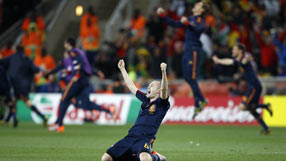Stylish Spanish settle for grinding out wins
JOHANNESBURG - In the face of tough Dutch opposition, Spain were unable to produce the eye-pleasing football that has been the hallmark of their rise to the pinnacle of the game but kept their cool to take their first World Cup title with yet another 1-0 win.

Those who hoped for an exhibition of fine movement and intricate passing in the World Cup final will have been left disappointed by a poor and largely scrappy game which was decided by an Andres Iniesta goal four minutes from the end of extra-time.
A tournament which had offered some glimpses of genius and moments of magic, but not the level of excitement that many would have desired, truly needed a final full of the best of the game.
Instead, however, spectators witnessed a stream of fouls, 47 in total, some rough, others purely disruptive and an astonishing 13 yellow cards and one red.
Despite the pedigree of the teams there was little of the quality football for which both countries have been noted for many years.
Tiredness on both sides led to a more open extra-time with chances for both teams, before Iniesta's strike but there was no coming together of Spanish 'Tiki-Taka' possession football and Dutch flair.
Some of the blame for the poor spectacle can be put on the nerves that accompany such an occasion, particularly understandable in the case of a Spain side playing in their first World Cup decider and a Dutch team keen to avoid their nation's third defeat in a final.
GETTING PHYSICAL
Get FourFourTwo Newsletter
The best features, fun and footballing quizzes, straight to your inbox every week.
But the Dutch strategy, particularly in the first half, of getting physical with the Spaniards also contributed to the disappointing entertainment.
It was an approach which resulted in eight of the Netherlands starting line-up receiving yellow cards from English referee Howard Webb.
The tough tackling and fouls worked, however. They unsettled Spain and stopped them getting the grip on possession that they enjoy so much and which has been the foundation for the success in the past three years.
The neutral may have been unimpressed but Netherlands coach Bert van Marwijk had clearly learned the lesson from Germany's defeat to the Spanish in the semi-final stage.
The Germans, hoping to play Spain on the counter-attack sat back and allowed Xavi and company to play 'keep ball' in midfield with the result that they had been unable to find their own rhythm or any sort of way to threaten the Spanish defence.
The Dutch preferred a battle for control in midfield, banking on the rugged Mark van Bommel and Nigel De Jong to impose themselves and allow Arjen Robben on the right and Dirk Kuyt on the left to exploit any space that emerged.
In the end it turned out to be defence-splitting passes through the middle that opened up Spain the best in the second half - both times Robben racing through but being foiled firstly by the legs of Spain keeper Iker Casillas and then failing to finish after he appeared to be pulled back by Carles Puyol.
Spain were unable to get the tempo up to the beats per minute that they need to be truly effective until the introduction of substitute Jesus Navas on the hour in place of forward Pedro.
David Villa and Sergio Ramos both had good chances in the latter stages to win the game
